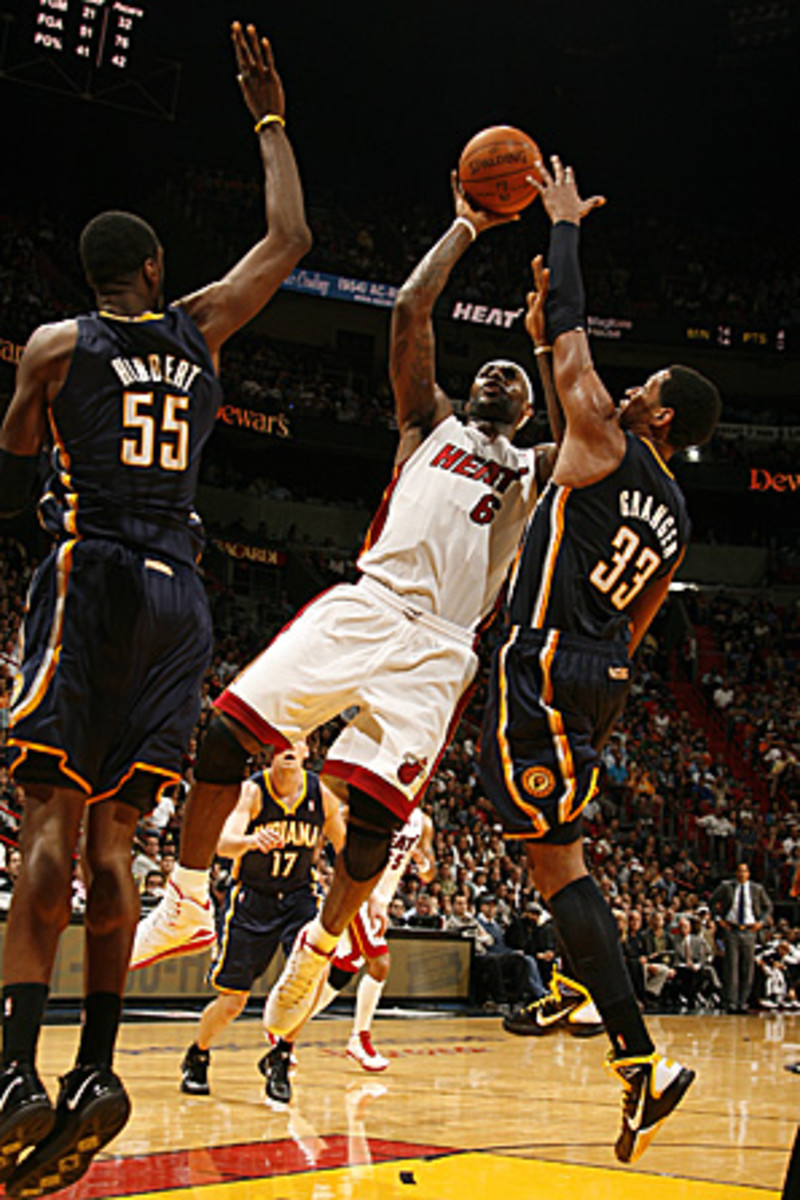
Why people hate LeBron James
And yet, at this moment, LeBron James is the most hated athlete in American sports. Millions of red-blooded Americans who saw "Pacers 93, Heat 77" Monday night (in Miami!) experienced a visceral joy.
And my question is: why?
I don't mean the hate is unjustified. Or justified, for that matter. I'm not here to judge America's judgment -- heck, I've been quite critical of LeBron myself. But let's pause for a second, put the hate on the stove to keep it warm, and think about this.
Why?
One of my sports writing mentors, Bill Shakespeare of the Stratford-On-Avon News-On-Newspaper, once bemoaned: "My only love, sprung from my only hate!" It was great stuff on a tight deadline -- off a rounders game, I believe. Anyway, our greatest collective hate should help explain our widespread love.
If we did not love sports, we would not hate LeBron James. He has not sinned against society. He has sinned against competition. And this sounds backward, but it's true: If he had sinned against society, we would have an easier time forgiving him. We all sin against society at some point. In sports, competition is everything.
The best players in the NBA hold a unique place in our sporting culture. They provide a spectacle that surpasses anything any individual in any other sport can provide.
There is not much difference between watching Albert Pujols and Ryan Howard -- Pujols is a better player, but you could argue Howard is more fun to watch, and anyway, the visual difference between a great player hitting a home run and a good player hitting one is pretty small. Football is a game of highlights, but they are team highlights. The most famous players, the quarterbacks, are generally not the fastest or the highest leapers, and the guys who are the fastest and jump the highest often touch the ball just a few times a game.
Hockey stars like Alexander Ovechkin are mesmerizing if you know the game, but most Americans don't really know the game, and anyway, they are on the bench more than they are on the ice.
Basketball is different. We are more emotionally invested in individuals than in teams. And as a result, there is a greater capacity for betrayal. The Seattle Mariners and Texas Rangers were both better after Alex Rodriguez left -- not because he left, but just because that happens in baseball. It doesn't happen in the NBA.
When James left Cleveland to form a "superteam" (it sounds so funny now, doesn't it?) with Dwyane Wade and Chris Bosh, he wasn't just giving Cleveland the finger or toying with us on national television. He was telling us that the entire enterprise doesn't matter -- the struggle, the connection with a city, any of it. The spoils are all that matter.
The irony is that LeBron James' desire to win a championship with his buddies might keep him from winning a championship. I am not counting out the Heat, in future seasons or even this year. But it is clear now what should have been clear in July: They don't need Chris Bosh.
Bosh was an All-Star in Toronto, and he is a better player than what he has shown in Miami. (He has actually played better lately -- and most importantly, rebounded better.) But a team with LeBron James and Dwyane Wade does not need another guy whose best skill is scoring 20-plus points per game. Miami needs rebounders and defenders and a savvy veteran point guard and a couple of shooters to knock down three-pointers when James and Wade draw double-teams.
Of course Pat Riley knows this. He must. Riley is still best known as the coach of the Showtime Lakers, but he didn't build those teams -- Jerry West did. Riley, the architect, believes in brick and mortar: He made near-stars of tough guys Charles Oakley and Anthony Mason and spent a decade building around Alonzo Mourning, one of the toughest stars in recent NBA history.
In a salary-cap league, if you have James and Wade on your team, you don't offer $110 million to Chris Bosh. You sprinkle that money around to role players who can play off those two guys.
But Riley couldn't do that, because all these guys were free agents together, and they all wanted to play together. Riley could not pick and choose. In order to get James, he needed Wade and Bosh. These three grew up in the star system of American basketball, and it is ingrained in their heads that stars are what matter. To that way of thinking, two stars are better than one and three are better than two. The other guys are just that: Other Guys. They are replaceable parts.
If James is paying attention, he should realize by now, the other guys do matter. The guys on the bench matter. The wide-eyed kids wearing oversized jerseys in the upper reaches of the arena matter. The yuppies paying too much money to sit courtside matter. The guys who got cut from the team matter, and the guys who played college ball but couldn't get a sniff of the NBA matter, and the guys who sat on the bench for their high school teams matter. Without them, LeBron James is just a guy doing cool stuff against nobody in an empty gym, for nothing.
And maybe that is at the heart of the hate. Maybe that is everything and the only thing -- the one truth we all must believe in if we're going to be modern-day sports fans. LeBron tried to circumvent that truth. He went for a shortcut. It's a sports sin we can't forgive, and won't forgive, unless some other guys whip Miami in the playoffs next spring, and maybe the spring after that. Then LeBron James will have served his penance.
In our minds, LeBron James tried to beat competition. It's the one victory we never want to see.




